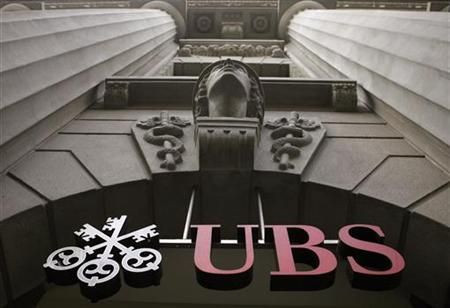UBS gives up on top-10 investment bank ranking

(REUTERS) -- UBS will sacrifice its place in the top ten investment bank rankings as stricter capital rules force it to give up riskier fixed-income business, the Swiss bank's financial head said.
Investment banks will continue to fight it out to top the league tables for total global fee pool. Two will make it, another three will think they can, UBS's Chief Financial Officer Tom Naratil told Reuters in an email interview.
With our strategy, we can't be one of them. Rather, we will be a top-tier investment bank in the eyes of our clients by focusing on them, and not ourselves.
The world's largest investment banks used to vie for top spots in the league tables by landing as many deals as possible, flaunting their large deals volumes to clients to show that they were credible business partners.
But the financial crisis has put the spotlight on more sustainable business models, and many banks are now saying they select the niche areas where they can be profitable, rather than offering all clients all products at all the time.
Industry data bears Naratil out. UBS is set to drop out of the top-ten of global bond rankings this quarter from seventh place in the third quarter, according to Thomson Reuters data on quarter-to-date rankings.
Naratil's comments come as the Swiss bank prepares for what it calls a year of mitigation, as it battens down the hatches for stricter Swiss capital rules meant to induce UBS and Credit Suisse to give up riskier business.
Swiss regulators have topped up international rules set out by Basel regulators, arguing Switzerland has to be better buffered because finance plays an outsize role in the country's economy.
In response, both big banks are scaling back risky assets, slashing costs and cutting jobs. UBS has pledged to ditch capital-guzzling activities like asset securitization and complex structured products.
2012 will be a transition year as we work to reach this goal by continuing to significantly reduce our risk-weighted assets while increasing our contribution to client-centric growth businesses, Naratil said.
UBS has also stepped away from an earlier vow to buy back assets it offloaded into a Swiss National Bank-managed fund as part of a 2008 rescue package.
The SNB wouldn't want us to buy back now, and it wouldn't make sense for us either, Naratil said, because it would run counter to efforts to whittle down riskier assets.
WALKING A TIGHTROPE
UBS last month cut its return-on-equity target to 12-17 percent for 2013, from a target of 15-20 percent that it abandoned in July. In addition to the investment banking revamp, UBS is also working to restore its reputation following a $2 billion rogue trading loss, uncovered in September.
Kweku Aboboli, who worked as a director of exchange-traded funds, was sent back to spend Christmas in jail after declining to enter a plea in court this week. Adoboli, who recently dropped his legal team and hired a new one, appears in court again January 30.
UBS, which wants to pay out a small dividend of 0.10 Swiss francs ($0.11) for the first time since it wrote down more than $50 billion in mortgage securities, is being urged by the Swiss National Bank to crimp shareholder payouts to bolster its capital.
The bank must walk a tightrope between pleasing long-suffering shareholders, who saw their stock severely diluted in the financial crisis and haven't received a payout since 2006, and appeasing the SNB and Swiss financial regulator
FINMA.
Naratil says UBS still has little regard for contingent convertible bonds, a capital-strengthening measure being urged by the SNB. Usually referred to as CoCo bonds, these are instruments which automatically convert into equity capital when a bank's common-equity ratio drops below a certain level.
We believe that non-dilutive loss-absorbing capital, including write-down debt, is the most efficient way to meet regulatory requirements, Naratil said.
Unlike UBS, Credit Suisse embraced CoCo bonds with a 6 billion Swiss franc issue to existing investors in February and a $2 billion public one shortly after.
($1=0.9362 Swiss francs)
(Reporting By Katharina Bart; Editing by Mike Nesbit)
© Copyright Thomson Reuters 2024. All rights reserved.





















